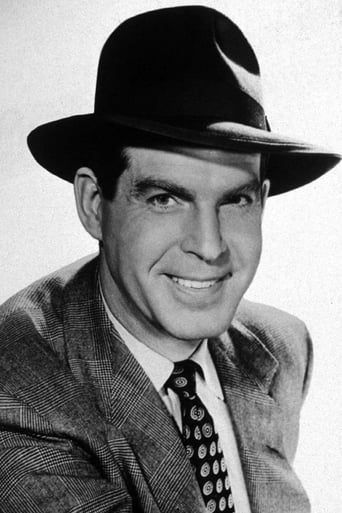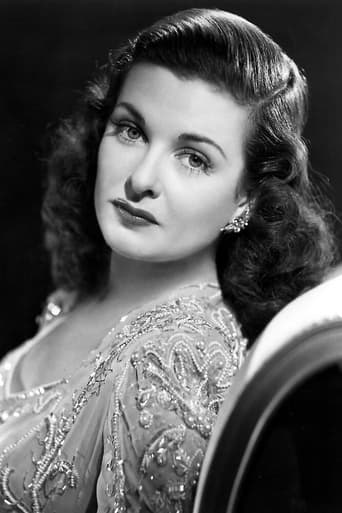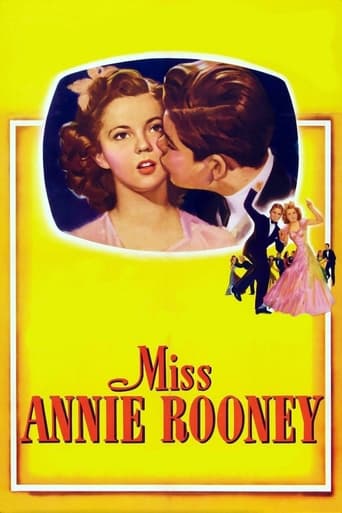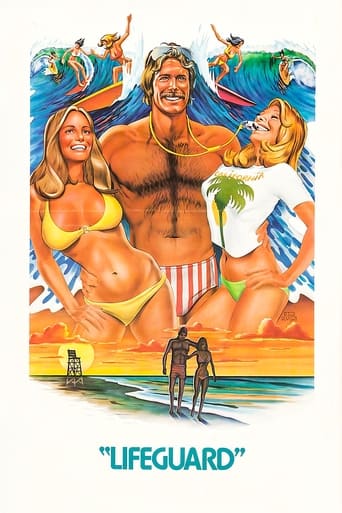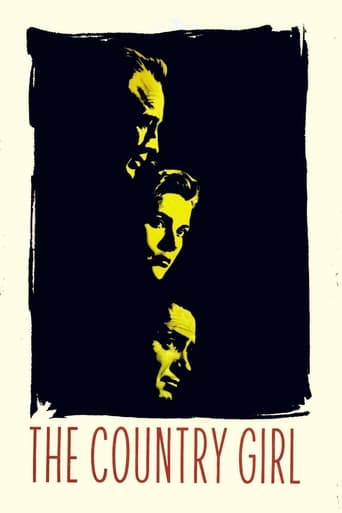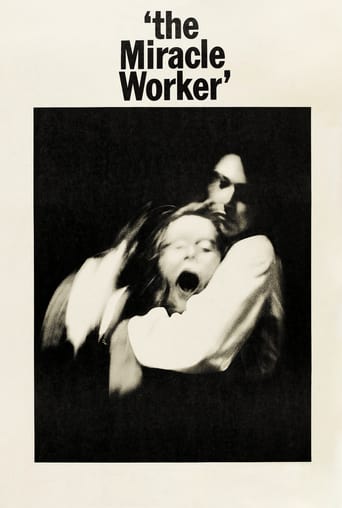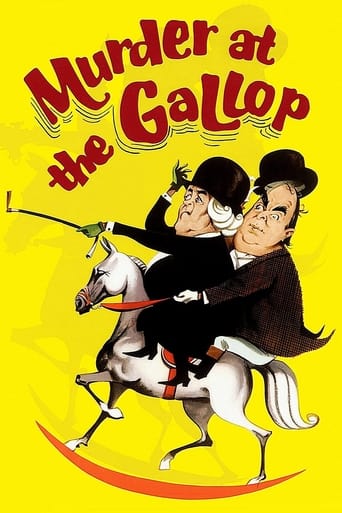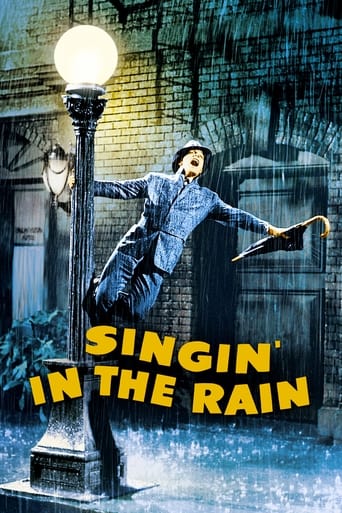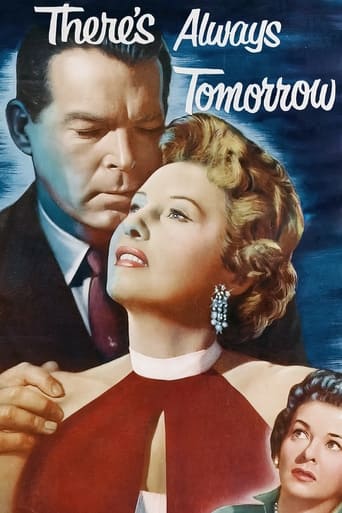
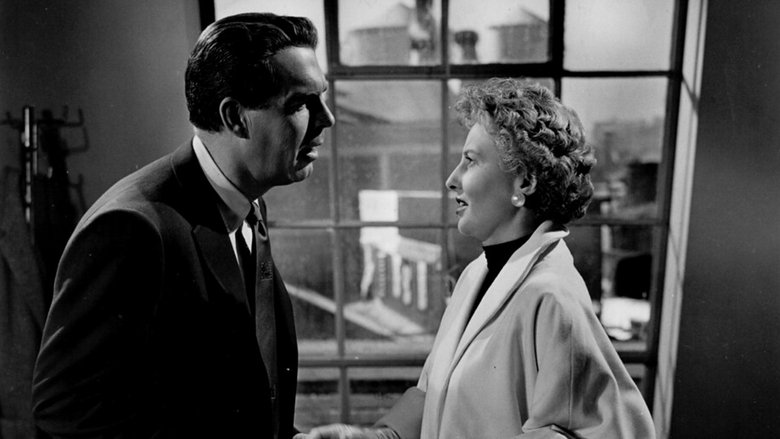
There's Always Tomorrow (1956)
When a toy manufacturer feels ignored and unappreciated by his wife and children, he begins to rekindle a past love when a former employee comes back into his life.
Watch Trailer
Cast


Similar titles
Reviews
Very Cool!!!
Memorable, crazy movie
I'll tell you why so serious
In truth, there is barely enough story here to make a film.
Pasadena toy manufacturer Fred MacMurray (as Clifford "Cliff" Groves) is wealthy and successful, but feels neglected by his busy family. His children are preoccupied with their own lives and loving wife Joan Bennett (as Marion) always finds herself committed to something other than time with Mr. MacMurray. He feels ignored, unappreciated and lonely. Enter former employee Barbara Stanwyck (as Norma Miller-Vale). Formerly plain, but now an attractive dress designer, Ms. Stanwyck arrives in Los Angeles on business. She's clearly interested in rekindling something with MacMurray...The best part here is that "There's Always Tomorrow" has director Douglas Sirk working in the 1950s, with his best photographer Russell Metty. This means artful shadows, stairways, windows and reflections. Such visuals, especially as they complement the story, are great. There is even a scene with Stanwyck's face shedding tears that are actually reflected raindrops; a technique said to have originated with "In Cold Blood" (1967). Quite possibly, this was done even earlier...The cast is strangely unimpassioned. MacMurray and Stanwyck lack the level of spark they conveyed in previous collaborations. Perhaps this is the point. MacMurray has become like the toy robot he created. He's "Rex" the walkie-talkie mechanical man. Stanwyck appears to be hesitating an attempted seduction. While not the protagonist, she becomes the most interesting character. Completely and most maddeningly in the dark, Ms. Bennett acts robotically unaware of the threat to her supposedly perfect family life. Shaking things up is suspicious and literate son William Reynolds (as Vinnie).******* There's Always Tomorrow (1/20/56) Douglas Sirk ~ Fred MacMurray, Barbara Stanwyck, Joan Bennett, William Reynolds
Douglas Sirk is renowned for injecting his subversive criticism of American society of the fifties in his glossy and glamorous melodramas. What made this palatable to the public, who flocked in droves, was the fact that the families involved were showbiz families ("Imitation of Life"), filthy rich oil magnates ("Written in the Wind") or highly idealized to the point of caricature ("All that Heaven Allows", "Magnificent Obsession"), far from the average movie goers own social milieu. And of course up there on the screen were the glamorous stars, Rock Hudson, Lana Turner, Lauren Bacall, Dorothy Malone, etc. Movie fans will recall the aforementioned movies when the topic of Sirk's movies arises. It is highly unlikely that "There's Always Tomorrow" will get a mention. "There's Always Tomorrow" has barely any gloss or glamour. The social criticism is completely without disguise. The family in question is one that the vast majority of movie goers could very easily identify with. Its stars (Fred MacMurray and a not so young Barbara Stanwyk) are not glamorous. While audiences left the cinema entranced by the glorious melodrama of "Imitation of Life" and "Written on the Wind", they would have left "There's Always Tomorrow" feeling a lot less secure about their own lives, since it's a film that touches on a fair amount of "dangerous" territory, calling into question the very foundations of the American family. Douglas Sirk's sense of irony has never been sharper. The title brims with optimism and the film opens with the script, "Once Upon a Time in Sunny California". But what unfolds is a bleak, pessimistic depiction of middle class family life.While Sirk's films have often been branded "woman's pictures", "There's Always Tomorrow" is indeed very much a man's picture. It takes a hard and deep look at the role of the male breadwinner and the picture it comes up with is not a pretty one. What we are shown is a man who when young, courted the prettiest girl, married, had children and worked hard to build up a successful business. He is now middle aged and having achieved it all, begins to feel himself taken for granted by his wife and children. His needs are completely neglected. His wife has little interest in him sexually being totally wrapped up in fulfilling the unending needs of their self centered ungrateful children. It's a scenario all too familiar to millions of men. Fred MacMurrays's Clifford Groves has become a robot similar to the one his successful toy manufacturer has created. No wonder that Norma Vale's (Stanwyk) reappearance in his life presents an opportunity to regain his lost dreams. She's an independent career woman, who sees his situation as somewhat idyllic from the outside. But with the usual intelligence of a Stanwyk character, she has no illusions as to a possible future with him. Despite the brief and obligatory conciliatory ending, Clifford Groves' future does not bode well. It should come as no surprise that the film was not well received at the box office. "There's Always Tomorrow" has many of the hallmarks of Sirk's craftsmanship. The studio refused to grant him his request for the film to be shot in color, despite having provided Universal with some of its highest grossing pictures of the decade. At least his demand for his favorite cameraman Russell Metty was granted. Metty as always, was the perfect partner in realising Sirk's vision. His interior filming in particular is a lesson in cinematography. He had a penchant for shooting characters behind banisters, framed in mirrors and caged behind fences to enhance the sense of their being trapped. MacMurray and Stanwyk are constantly gliding through dark shadow and bright light reflecting the inherent brightness and darkness in their lives. At this point of writing "There's Always Tomorrow" has not been released in any format and rarely gets a showing on television. It's a gross injustice to an extremely important director and a wonderfully made, moving piece of cinema.
In this Douglas Sirk-directed sudser, Fred MacMurray plays a toy manufactorer who becomes tired of his routine homelife and falls into the waiting arms of Stanwyck, his lover from 20 years earlier. MacMurray's son (William Reynolds) eventually becomes suspicious of his dad's whereabouts and snoops around to find out exactly what is going on. And MacMurray's unintentionally neglectful wife (Joan Bennett) is completely oblivious to her husband's attraction to Stanwyck, as the flashy New York City designer."There's Always Tomorrow" is an interesting film in that it examines the dark-side of the 1950s nuclear family....something that Sirk had always been interested in. Stanwyck and MacMurray have an undeniable chemistry that is given new life after their 1946 classic "Double Indemnity". The performances shine, and many of the scenes are given classic Sirk touches (such as the reflection of the rain streaming down the window on Stanwyck's face, after her showdown with MacMurray's children). However, this movie adds nothing new to the routine formula, of the tempting female disrupting the lives of a happy family. Good overall, but it lacks a certain punch.
This film is one of the great Hollywood films yet so few have ever heard of. Not only does it rate with Douglas Sirk's better known films ("Magnificent Obsession," "All that Heaven Allows," and "Imitation of Life), but is as much a devastating a critique of the American Dream as other fifties movies like "Bigger Than Life." And unlike many melodramas which center on the emotional isolation and turmoil of the central female character, this one analyzes the pain of the main male figure (Fred MacMurray). The film's acting, direction, and script have a precision so well thought out that the effect--both at any given moment and overall --is absolutely astonishing. An incredible film crying out to be rediscovered.


